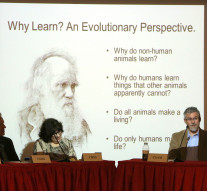Photo courtesy of Joanna Madloch
Students and faculty gathered in Brantl Lecture Hall in Dickson Hall on Wednesday, April 29, where the Institute for the Humanities hosted a cross-campus inter-college panel discussion asking the question, “Why learn? To make a living or make a life?”
Each faculty representative was given five minutes to address the question. Up first was Dr. Mark Hardy from the College of the Arts. To him, making a life wins, especially for those who choose his respective college.
“Most foolish people who enter the performing arts do it out of some insane passion,” Hardy said, before explaining that students in the arts have to be a little bit crazy, with passionate reasons rather than rational ones. But to live, regardless of career, one must do two things: create a living and then find some way to support a creative life. “We are always at war with these two polarities,” said Hardy.
Next to speak was Dr. Maughn Gregory from the College of Education and Human Services. Accompanying his speech was a PowerPoint listing some goals of education: making the most of one’s talents, living meaningfully and getting a job were among them.
“Some of these different goals reinforce each other, but others undermine each other,” Gregory said. He said the one that conflicts with the others is getting a job. If one solely focuses on this goal, he or she will ignore all of the rest.
Dr. Naomi Liebler from the English department, speaking for the College of Humanities and Social Sciences, then took the floor.
Liebler discussed the credential one receives after graduating, describing it as a “coupon you can turn in for employment.” She did not deny the importance of this credential, but stressed how crucial it is to have more than that.
“We need to think of information as a tool,” Liebler said. She then expressed her love for William Shakespeare and explained how he didn’t make it past the sixth grade, but managed to affect so many people.
Just as Liebler raved about Shakespeare, the next to speak, Dr. Scott Kight, a biology professor from the College of Science and Mathematics, raved about salamanders.
“Forget humans. Let’s talk about salamanders,” Kight joked. The living world shapes learning and salamanders prove this by learning to make a living. A picture of Charles Darwin appeared on the screen. Darwin didn’t have to work because he had rich parents and because of this he was able to make a life and do what he loved.
“After you’re done surviving and reproducing, you get to make a life,” Kight said. “No matter how many of us struggle a little bit, we’re immensely wealthy and we’re privileged that we get to make such a life.”
Last to speak was Dr. Nicole Bryan from the School of Business. She explained the public self versus the private self.
“People question: does it make sense to be socially responsible in your business or is that separate?” Bryan said. But, in her opinion, the private self always has a way of coming out. She also discussed learning as a discovery process. “My hope is that it will make someone more satisfied with life,” she said.
The question and answer portion followed. An audience member asked Bryan how she convinces Business students to think about things other than just making a living and that got all of the representatives talking. Bryan discussed how diversity of thought is important; Hardy agreed, also stressing how a student with enormous collaborative skills is more appealing than one with just one skill.
Kight explained how he used to question why he had to take certain classes in college, but now understands.
“As a person who’s making a life, it speaks to a deeper level,” Kight said. “I embrace those topics when I’m not making a living.”
Throughout their discussions, all five representatives mentioned the importance of making a life, even if it means making a living first, and they hope students will embrace learning and living.




